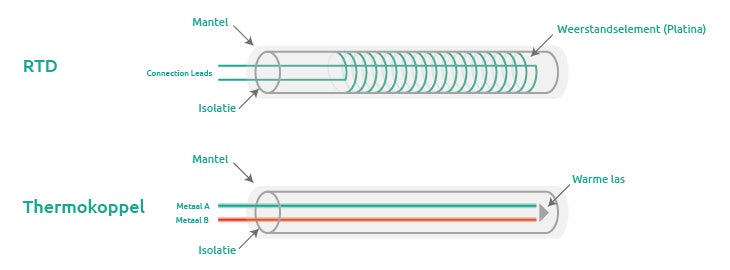In the industry, temperature is an important parameter for monitoring and controlling processes. There are several ways to measure temperature, but the most commonly used are resistance thermometers and thermocouples. Based on the desired accuracy and the temperature range to be measured, you can determine which type of temperature sensor is appropriate. In this article, we explain the differences between a resistance thermometer and a thermocouple.
Resistance Thermometer
The Pt100 is a widely used temperature sensor in measurement and control technology. The reason for this is that this type of sensor has a large measurement range and provides an almost linear reading. Additionally, this type of sensor is highly accurate, durable, and easy to use. However, a downside is that a Pt100 can only measure up to 650°C. Therefore, this sensor is not commonly used in industries such as chemical, petrochemical, and energy. For higher temperatures, thermocouples are better suited.
How does a Pt100 work?
Pt stands for Platinum, and the 100 refers to the electrical resistance (100 ohms) of the sensor at a temperature of 0°C. When the temperature of the platinum changes, the resistance also changes, and this change in resistance makes the temperature measurable. The resistance changes because the atoms of a metal or semiconductor move faster as the temperature rises. As a result, the electrons find it harder to pass through the metal or semiconductor.
There are also other variants of resistance thermometers with different levels of accuracy. For example, we also offer Pt-20, Pt-50, Pt500, Pt1000, and Ni-100 sensors.
Thermocouples
A thermocouple measures temperature in a completely different way. A thermocouple consists of two different wires (metal or metal alloys) connected at one end (hot junction). When the hot junction is exposed to temperature changes, a potential difference arises between the two wires, and the magnitude of this difference depends on the measured temperature.
Temperature measurements with thermocouples are mainly used in high-temperature industrial processes where a Pt100 can no longer be used. Using a thermocouple is less straightforward than using a Pt100 because, in addition to the hot junction, a cold junction must also be considered.
Custom Temperature Sensors
Because temperature measurements are used in many processes, there are many possibilities for customizing a sensor to fit perfectly with the situation. Istec specializes in custom temperature sensors and can manufacture any resistance thermometer or thermocouple. Feel free to contact our specialist to discuss your needs at 0252 433 400.

